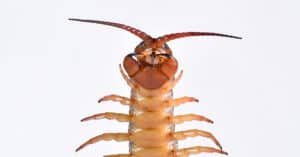Centipedes, with their numerous legs and swift movements, can be quite unsettling to encounter. If you’re looking for ways to keep these arthropods at bay, you’ll be glad to know that there are scents that centipedes absolutely detest. By harnessing the power of these smells, you can create a natural deterrent and minimize the presence of centipedes in your home or garden. In this article, we explore 10 smells centipedes hate, offering you an arsenal of options to keep these creepy crawlers away. From the refreshing aroma of peppermint to the zesty scent of citrus, we’ll delve into these natural repellents and provide insights into their potential efficacy. Whether you prefer essential oils, herbs, or everyday ingredients, you’ll find a variety of options to suit your preferences.

1. Peppermint

The strong scent of peppermint has been shown to repel centipedes.
©rawf8/Shutterstock.com
Peppermint has a strong and refreshing scent, and it’s definitely one of the smells centipedes hate. In fact, they find it repulsive. The strong aroma of peppermint oil can disrupt their sensory receptors, making it difficult for them to navigate and locate food sources. The potent smell acts as a deterrent, encouraging centipedes to avoid areas treated with peppermint. While the effectiveness may vary, many people have reported positive results with peppermint as a natural centipede repellent.
2. Citrus

Citrus is a scent that can repel centipedes.
©leonori/iStock via Getty Images
The vibrant and citrusy scents of fruits like oranges, lemons, and grapefruits repel centipedes. Centipedes dislike the strong acidic smells of citrus, which can interfere with their ability to detect prey or navigate their surroundings. Using citrus-based cleaning products or placing citrus peels in areas where centipedes are common may help deter them. However, the effectiveness of citrus scents as centipede repellents may vary depending on the individual and the specific circumstances.
3. Tea Tree Oil

Tea Tree Oil is known to repel centipedes.
©Iv-olga/Shutterstock.com
Derived from the leaves of the tea tree plant, tea tree oil possesses potent antimicrobial and insect-repellent properties. While primarily known for its effectiveness against other pests like ants and spiders, tea tree oil is believed to have a similar effect on centipedes. The strong smell of tea tree oil can overwhelm centipedes’ olfactory senses, making them less likely to inhabit treated areas. However, the efficacy of tea tree oil as a centipede repellent may vary. Dilute the oil and use it sparingly.
4. Lemongrass

Lemongrass can help deter centipedes.
©NIKCOA/Shutterstock.com
One of the smells centipedes hate is Lemongrass, with its citrusy and earthy scent, is popular for its insect-repellent properties. Centipedes dislike the strong smell of lemongrass, which can disrupt their sensory receptors and deter them from entering treated areas. Lemongrass essential oil or fresh lemongrass leaves can create a natural centipede-repellent spray. You can also place them in strategic areas where centipedes are common. However, as with other scents, the effectiveness of lemongrass as a centipede repellent may vary from case to case.
5. Lavender

The lovely scent of lavender can help repel centipedes.
©botamochi/iStock via Getty Images
Lavender, known for its sweet and floral aroma, is a scent that centipedes dislike. The strong fragrance of lavender can overwhelm their senses and discourage them from inhabiting treated areas. Lavender essential oil can be used in a spray or diffuser to create a centipede-repelling environment. Additionally, dried lavender sachets or fresh lavender bundles may help deter them. However, it is important to note that the effectiveness of lavender as a centipede repellent may vary, and it may be more effective when used in combination with other preventive measures.
6. Onion

The strong scent of onion is known to repel centipedes.
©Dominique James/Shutterstock.com
Onions have a pungent and distinct smell due to their sulfur compounds. This strong odor is unpleasant for centipedes, deterring them from entering treated areas. The sulfur compounds in onions can interfere with centipedes’ sensory receptors, making it more challenging for them to navigate and locate prey. However, the efficacy of onion scent as a centipede repellent may vary, and it may be more effective when used in conjunction with other preventive measures.
7. Cedarwood

The woody smell of Cedarwood can potentially deter centipedes.
©Madeleine_Steinbach/iStock via Getty Images
Cedarwood has a pleasant and woody aroma that repels centipedes. The scent of cedarwood is disliked by many insects, including centipedes. The natural oils found in cedarwood, such as cedrol, have insect-repellent properties that can disrupt centipedes’ sensory receptors and discourage them from inhabiting treated areas. Cedar blocks, cedar chips, or cedar essential oil can be used to create a barrier. You can spray it in areas where centipedes are common. Cedarwood is generally effective in repelling centipedes and other pests.
8. Eucalyptus

The smell of Eucalyptus is thought to repel centipedes.
©Gheorghe Mindru/Shutterstock.com
Eucalyptus, with its strong and invigorating scent, is a natural centipede repellent. The potent aroma of eucalyptus oil can overwhelm centipedes’ olfactory senses, making them less likely to reside in treated areas. Eucalyptus oil contains compounds like eucalyptol, which have insect-repellent properties. By diffusing eucalyptus oil or using eucalyptus-based cleaning products, you can create an environment that is less appealing to centipedes. However, the efficacy of eucalyptus as a centipede repellent may vary. We recommend using it in conjunction with other preventive measures.
9. Citronella

Citronella is a natural repellant for many insects, including centipedes.
©rawf8/Shutterstock.com
A well-known natural insect repellent, Citronella repels centipedes. The distinct citrus-like scent of citronella oil is unpleasant to centipedes, making them less likely to enter treated areas. Citronella oil masks the scents that attract centipedes, making it harder for them to locate food and shelter. Candles, torches, or essential oil diffusers can create a centipede-repelling environment. Citronella is generally effective in repelling centipedes, but its efficacy may vary depending on the specific circumstances.
10. Marigold

Centipedes are said to avoid marigolds.
©Quang Ho/Shutterstock.com
Marigolds have a strong, distinctive smell that repels centipedes. The scent of marigolds contains compounds that act as natural insect repellents. The strong aroma can deter centipedes from entering treated areas, making them seek alternative habitats. Planting marigolds in your garden or placing fresh marigold flowers in areas where centipedes are common may help discourage their presence. However, the efficacy of marigold scent as a centipede repellent may vary. Try combining it with other preventive measures for best results.
Conclusion
Understanding the smells centipedes hate can provide you with a natural and effective way to repel these unwanted creatures. From the refreshing aroma of peppermint to the pungent smell of onions, each scent on the list offers unique properties that can deter centipedes from infiltrating your space. While their efficacy may vary depending on factors such as species and environmental conditions, incorporating these scents into your pest control strategy can create a less inviting environment for centipedes.
Remember, while these scents likely repel centipedes, it is important to note that their effectiveness may vary depending on factors such as the species of centipede, environmental conditions, and individual preferences. We recommend experimenting with different scents and using them in combination with other preventive measures for the most effective centipede control.
The photo featured at the top of this post is © I Wayan Sumatika/Shutterstock.com
Thank you for reading! Have some feedback for us? Contact the AZ Animals editorial team.






